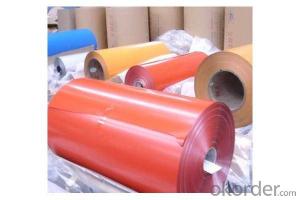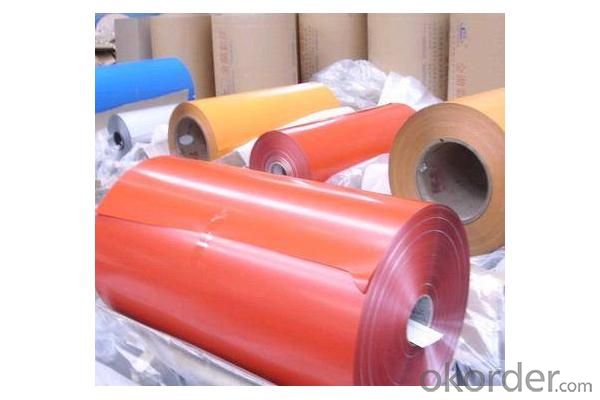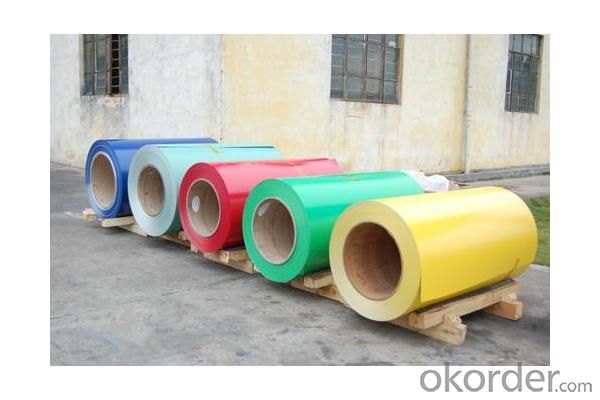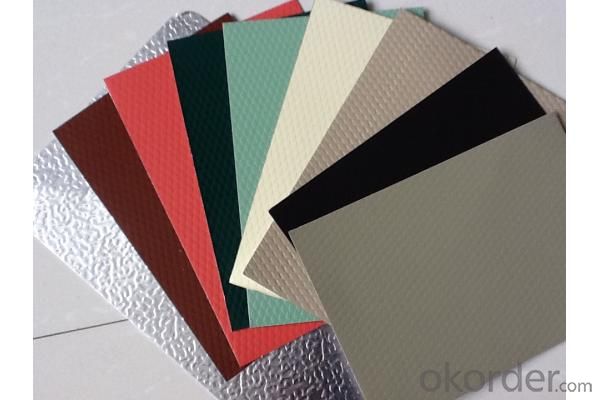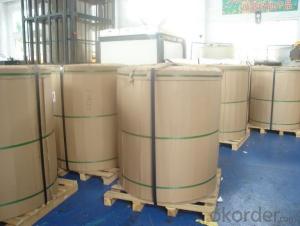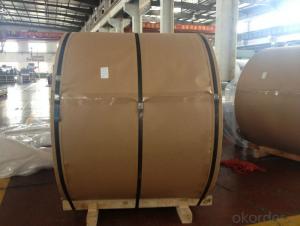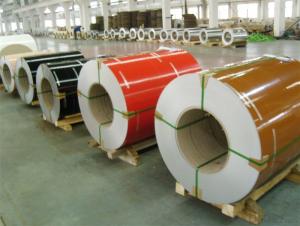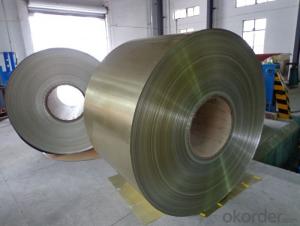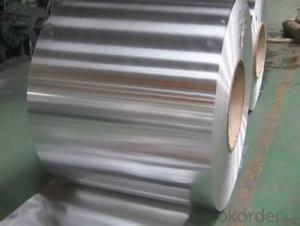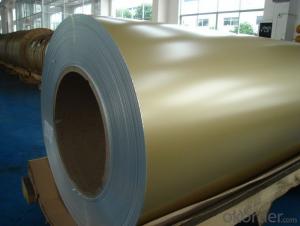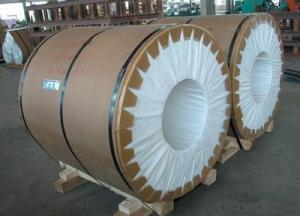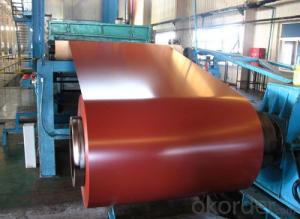Jeep Kl Cherokee Aluminum Coil Spacers - Color Coated Aluminium Coils for Various Applications
- Loading Port:
- Tianjin
- Payment Terms:
- TT OR LC
- Min Order Qty:
- 100 m.t
- Supply Capability:
- 10000 m.t/month
OKorder Service Pledge
OKorder Financial Service
You Might Also Like
Specification
Specification of Color Coated Aluminum Coil | |
Alloy | 1050 1060 1070 1100 1200 1235 / 3003 5052 5083 6061 6063 5005 etc. |
Alloy or not | Non-alloy / Alloy |
Temper | O, H112, T4, T5, T6, T651 etc. |
Specification | Thickness: 0.5mm - 500mm |
Width: 600mm - 2200mm | |
Length: 1000 - 6000mm or in coil size | |
Surface | coated |
Application | Heat preservation\ refrigerator\ Furniture\ decorate\ industry\ |
construction\ mould and so on | |
Features | 1.With good plasticity no matter in Cold and Hot condition; |
2. Can be pressed into various shapes of Construction Profile; | |
3. Easy to weld and cold process with good mouldability; | |
4. Can be processed into Sheet, Strip, Tube, Bar, Profile, Forged Piece, etc | |
5. Long life time. | |
MOQ | 3 Ton |
Package | wooden pallets or as customer request |
payment | 30% by T/T as deposit, and the rest 70% balance before loading. |
Delivery time | 15-30 days after receiving the deposit. |
Coating of Color Aluminum Coil
Coating thickness | PVDF >=25micron POLYESTER>=18micron |
Color standard | E < 2 or it is not obvious by eyeballing |
Pencil hardness | > 2HB |
Coating adhesive | not lower than first grade Impact: no any crack (50kg/cm, ASTMD-2794:1993) |
Bend strength | >100 times |
Boiling point: | no any distortion and color change (in the 99 more or less 1 degree water, then cooling 2 hours) |
Corrosive | surface deep in the 5% muriatic acid and 5% NaCL, |
interior deep in the 2% muriatic acid and 2% NaCL, after 48 hours, no change |
Application of Color Coated Aluminum Coil
Main Usage: Aluminium curtaim wall, Aluminium Composite Panel, Aluminium Honeycomb Plate, Ceiling,
Roof, Roller Shutter Door, Garages Door, Furniture, Electronic Industry, etc.
Our services
Main Services:
> Precision aluminum plate
> Casting products
> Forging products
Special Services:
> Alloy selection
> Aluminum machining techniques
> Hot working
> Surface treatment
Our Promise
---High quality stainless steel with reasonable price.
---Wide excellent experiences with after-sale service.
---Every process will be checked by responsible QC.
---Professional packing teams which keep every packing safely.
---Trial order can be done in one week.
---Samples can be provided as your requirements.
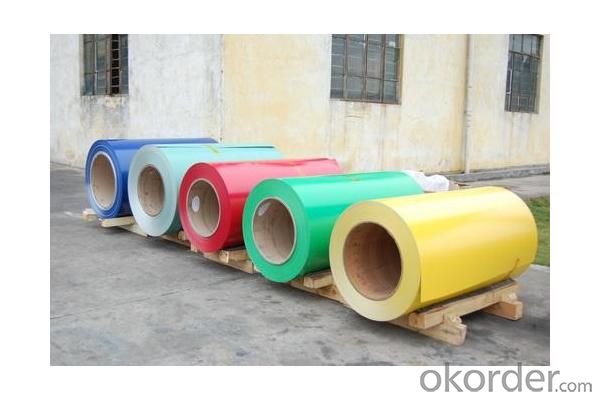
- Q: What do the two items (COIL:873347 HEAT: number) on the label of the raw material of aluminum coil stand for?
- COIL means aluminum coil and HEAT means heating, so together they mean hot rolled coil.
- Q: Well, we've got the existing old school 7 layers of peeling yucky painted siding and we're trying to weigh our options. So here's my questions:1) Is it cost effective to replace Aluminum with Vinyl?2) Is Vinyl truly as costly as we keep hearing? **Home is small 1,100 sq.ft with a 2.5 car Garage**3) Is painting this existing siding a wise choice since the current paint job on it looks terrible? We just need to make it more a home, right now it's gorgeously all new and redone inside and on the outside it still resembles the day we bought it in forclosure. Aside from my green grass I busted my butt on last summer.Please advise.
- get the siding. its not that expensive and you will never have to paint again!
- Q: What are the width tolerances for aluminum coils?
- The width tolerances for aluminum coils can vary depending on the specific application and industry standards. However, in general, the standard width tolerances for aluminum coils typically range between +/- 0.005 inches to +/- 0.020 inches. These tolerances ensure that the width of the aluminum coil falls within an acceptable range and meets the required dimensions for the intended use. It is worth noting that tighter tolerances may be achievable depending on the specific manufacturing processes and equipment capabilities. Therefore, it is essential to consult the appropriate industry standards and specifications to determine the exact width tolerances required for a particular application.
- Q: How are aluminum coils protected against UV degradation?
- Aluminum coils are commonly protected against UV degradation through the application of protective coatings or treatments. These coatings act as a barrier between the aluminum surface and the harmful ultraviolet (UV) rays from the sun, preventing them from causing damage or degradation to the metal. One common method of protection is the application of organic coatings, such as polyvinylidene fluoride (PVDF) or polyester coatings. These coatings are specifically formulated to provide excellent resistance against UV radiation. They form a durable and protective layer on the surface of the aluminum coil, shielding it from the harmful effects of prolonged sun exposure. Another method is anodizing, which involves an electrochemical process that creates a protective oxide layer on the aluminum surface. This oxide layer acts as a barrier against UV rays and prevents them from reaching the underlying metal. Anodized aluminum coils are known for their excellent resistance to UV degradation and are commonly used in outdoor applications where long-term durability is required. In addition to these protective coatings and treatments, aluminum coils can also be designed with specific alloy compositions that enhance their resistance to UV degradation. Certain alloy elements, such as magnesium and manganese, can improve the natural ability of aluminum to withstand UV radiation. These alloy additions increase the overall durability and UV resistance of the aluminum coil, minimizing the potential for degradation over time. Overall, the protection of aluminum coils against UV degradation is a critical consideration in applications where the coils are exposed to sunlight. By utilizing protective coatings, anodizing, or selecting appropriate alloy compositions, manufacturers can effectively safeguard the aluminum coils and ensure their long-term performance and durability even in challenging outdoor environments.
- Q: Are aluminum coils suitable for coil winding applications?
- Coil winding applications can utilize aluminum coils, as they possess numerous advantageous properties. Firstly, aluminum is lightweight, facilitating easier handling and transportation. Industries like automotive and aerospace, which prioritize weight reduction, find this particularly beneficial. Moreover, aluminum exhibits excellent conductivity, ensuring efficient electrical current flow within the coil. This is especially advantageous for applications requiring high performance and low resistance, such as transformers and electric motors. Additionally, aluminum's high resistance to corrosion renders it suitable for outdoor and harsh environments. Unlike metals like steel, it does not rust and can endure exposure to moisture and chemicals. Furthermore, aluminum coils offer cost-effectiveness. Compared to metals like copper, commonly used in coil winding, aluminum is generally more affordable. Thus, it presents a cost-efficient option for various industries. Nevertheless, it is important to acknowledge that aluminum has lower electrical conductivity than copper. Therefore, in applications where high conductivity is paramount, such as power transmission, copper coils may be more suitable. Nonetheless, aluminum coils provide numerous benefits and find widespread use in various coil winding applications.
- Q: This question asks for the uses or applications of aluminum coil in various industries or contexts.
- <p>Aluminum coil has a wide range of applications due to its lightweight, corrosion resistance, and high thermal conductivity. It is commonly used in construction for roofing and siding, in the automotive industry for parts and heat exchangers, and in the packaging industry for food and beverage cans. Additionally, aluminum coil is utilized in electrical applications such as transformers and electrical wiring due to its excellent conductivity. It is also employed in the manufacturing of household appliances, furniture, and various consumer goods. The coil's malleability makes it suitable for forming into various shapes and sizes, enhancing its versatility across different sectors.</p>
- Q: i know aluminum nitrate will dissociate, and also that there is no way that the nitrate will react to make the solution basic or neutral. But what about the aluminum ion? Does it take OH- from water to make [Al(OH)4]- and make the solution acidic? Does it somehow take protons and make a basic solution? My teacher said its not neutral, so I'm leaning towards an acidic solution. Thanks!
- Aluminum nitrate is the salt produced by the reaction of aluminum hydroxide and nitric acid. Nitric acid is a strong acid. Aluminum hydroxide is a realtively weak base. So the salt will be acidic.
- Q: Are aluminum coils fire-resistant?
- Aluminum coils possess fire-resistant qualities due to their high melting point of 660 degrees Celsius (1220 degrees Fahrenheit) and their inability to burn, rendering them non-combustible. This specific characteristic allows for the utilization of aluminum coils in various applications, particularly in sectors where fire resistance is of utmost importance, such as building construction, electrical wiring, and HVAC systems. Moreover, the remarkable heat conductivity of aluminum facilitates rapid heat dissipation, thereby minimizing the risk of fire incidents. Nevertheless, it is crucial to acknowledge that although aluminum coils themselves exhibit fire-resistant properties, they may be incorporated into systems alongside other components that might not share the same level of fire resistance. Consequently, it is essential to consider the entirety of the system and adhere to proper fire safety regulations and guidelines to ensure comprehensive fire safety precautions.
- Q: What are the weight savings achieved by using aluminum coils?
- Compared to materials like steel, significant weight savings can be achieved by using aluminum coils. Aluminum, a lightweight metal with a density approximately one-third that of steel, allows for greatly reduced overall weight when utilizing aluminum coils instead of steel coils. The benefits of weight savings attained through aluminum coil usage are numerous. In industries such as automotive and aerospace, reducing weight is crucial for enhancing fuel efficiency and increasing payload capacity. Lighter vehicles and aircraft require less energy for operation and can accommodate more passengers or cargo, resulting in cost savings, improved performance, and minimized environmental impact. Moreover, the weight savings obtained from aluminum coils can provide practical advantages in other applications as well. For instance, in HVAC systems, lighter coils facilitate easier installation and transportation, thereby reducing labor and logistics costs. The actual weight savings achieved by utilizing aluminum coils will vary depending on the specific application and design specifications. Nonetheless, it is widely acknowledged that aluminum coils offer a significant weight advantage over alternative materials. The actual weight savings can range from 30% to 70% or more, depending on the specific comparison being made. To summarize, the weight savings achieved through the use of aluminum coils can be substantial. This lightweight material offers numerous benefits in terms of fuel efficiency, payload capacity, performance, and cost savings. When prioritizing weight reduction, aluminum coils are an excellent choice for a wide range of industries and applications.
- Q: I am trying to electropolish the surface of a 3003 aluminum sample to analyze in the SEM. I was wondering if anyone knew what electrolyte and electropolishing paramaters work for this alloy. So far I have used phosporic+ethanol+water at 50V for 2 minutes with minimal success.
- Aluminium needs deoxidizing also called as desmutting after electropolishing. This is done in a hot chromic acid bath for nearly for 5 minutes.
Send your message to us
Jeep Kl Cherokee Aluminum Coil Spacers - Color Coated Aluminium Coils for Various Applications
- Loading Port:
- Tianjin
- Payment Terms:
- TT OR LC
- Min Order Qty:
- 100 m.t
- Supply Capability:
- 10000 m.t/month
OKorder Service Pledge
OKorder Financial Service
Similar products
Hot products
Hot Searches
Related keywords
